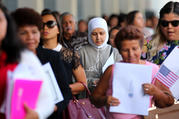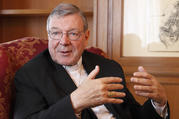Loading...
Click here if you don’t see subscription options
Click here if you don’t see subscription options

Politics & SocietyOf Many Things
During a time of political polarization, writes Matt Malone S.J., it is more often the serious business of governing that is a distraction—from the partisan combat that has become our all-consuming pastime.

Politics & SocietyFeatures
We can no longer tolerate the serious problems that result from a broken and fragmented health care financing system.

Politics & SocietyEditorials
In the absence of irrefutable evidence, the public response has fallen, as with so much else in this era of polarization, along partisan lines.

Politics & SocietyDispatches
“We cannot let this moment of pandemic, which calls us all to unity as God’s children, become the occasion for further prejudice, exclusion and injustice.”

Politics & SocietyVatican Dispatch
The High Court of Australia announced that in a unanimous 7-0 decision, they found that “the jury, acting rationally on the whole of the evidence, ought to have entertained a doubt as to the applicant’s guilt.”

Politics & SocietyShort Take
The coronavirus has arrived as politics has become increasingly important to identity, writes Julie Hanlon Rubio. How can we rethread the ties that bind us together, and do so quickly?

FaithFaith and Reason
Catholic social teaching offers us principles for reflection, criteria for judgment, guidelines for action which can guide our individual, institutional and national choices.

FaithLast Take
I have come to believe that, while we certainly continue to need people of good will to serve in elected office, meeting the challenges our country faces will require more than just policy-making.

Politics & SocietyNews
Though 52% of Catholic voters cast ballots for Trump in the 2016 presidential election, the majority of Latino Catholics overwhelmingly voted for Democratic candidate Hillary Clinton.

Politics & SocietyFeatures
As walls go up, so does the hoarding behind them
